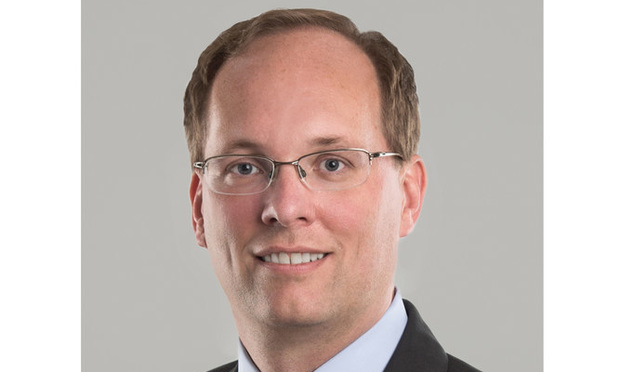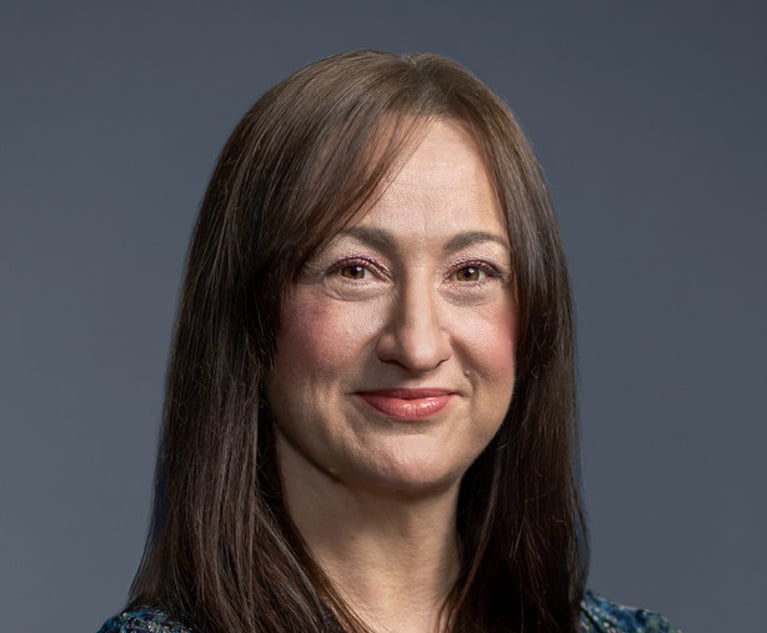Recent Acting OCC Chief Noreika Returns to Simpson Thacher
“There are always inflection points for what you want to do with your life,” said Keith Noreika, formerly head of the OCC. “What's nice about these episodes is you can sort of take stock of your strengths and what you're best at doing."
January 09, 2018 at 01:33 PM
5 minute read
 Keith Noreika. Courtesy photo.
Keith Noreika. Courtesy photo. After about seven months temporarily leading the Office of the Comptroller of the Currency, Keith Noreika has returned to Simpson Thacher & Bartlett.
“I am back to doing what I've done the past 20, 25 years—advising clients on how to navigate the regulatory structure in this country to achieve their goals to have safe and sound operations,” Noreika said in a phone call Monday afternoon.
Noreika served as the acting comptroller of the federal banking agency from May to November, following former comptroller and Obama appointee Thomas Curry's departure. Joseph Otting assumed the role of comptroller in November.
Noreika will continue at Simpson Thacher as a partner in the financial institutions practice based in Washington, D.C. He will focus on banking regulation and related litigation, according to a press release from the firm issued Monday.
Prior to serving at the OCC, Noreika had worked as a partner with Simpson Thacher for about 10 months, according to his LinkedIn profile.
Noreika said coming out of the government, he had “many opportunities.” He didn't name other specific offers but said that they included nonlegal roles.
“There are always inflection points for what you want to do with your life,” Noreika said. “What's nice about these episodes is you can sort of take stock of your strengths and what you're best at doing. It became evident the law and policies are what I have a forte in. That's where my talents are best spent.”
Heading the OCC was never supposed to be a permanent job, Noreika said. He knew going in that it was temporary. Although it was nerve-wracking at times not knowing if his tenure “would last five years or end tomorrow,” he feels like he was able to accomplish quite a bit.
One of the major achievements under his watch, Noreika believes, was progress on what's often known as the OCC's “fintech charter.”
The OCC proposed a special purpose bank charter in March 2017 that would allow fintech companies to apply to become banks. This status would likely allow them to sidestep state-by-state regulation and instead be subject to more unified federal regulation.
The following month, the Conference of State Bank Supervisors sued the OCC. A month later, the New York State Department of Financial Services filed a similar suit, naming Noreika as a co-defendant. The lawsuit, which alleges the OCC does not have the authority to issue a special purpose bank charter, was dismissed last month. The judge essentially ruled that because the fintech charter has not been finalized, the agency cannot be sued. The NYDFS has made it clear that if and when a fintech charter is granted in the future, it intends to sue the OCC again.
“It's certainly their right to try and they will have their day in court,” Noreika said. “I expect they'll fail.”
If the fintech charter does in fact move forward, he said “it's all about finding the right candidate to be a bank.”
“All of the hubbub is a little bit overstated. If you find that right fintech that is [bank-like] and ready to adhere to obligations of operating like a bank, I don't think there's going to be a lot of controversy.”
As for whether Noreika, 45, intends to return to the public sector, it won't be in the near future. “This was a perfect opportunity to serve the country in a discrete way,” he said. “I may in a longer way later in my career. Now I want to do the things I wanted to do in the private sector.”
Lee Meyerson, a Simpson Thacher partner and head of the firm's financial institutions practice, said Noreika will provide clients “a unique perspective on the rapidly changing world of financial services regulation.”
“His knowledge and insights will assist our clients in managing complex regulatory issues and expanding their operations through mergers, capital markets activities and business line investments, including fintech,” Meyerson said in the press release. “His years of valuable litigation and investigations experience will continue to be an added asset.”
Prior to his tenure at Simpson Thacher, Noreika served as a partner with Covington & Burling for roughly 18 years. He started as an associate with the firm in 1998 and was named partner in 2005.
This content has been archived. It is available through our partners, LexisNexis® and Bloomberg Law.
To view this content, please continue to their sites.
Not a Lexis Subscriber?
Subscribe Now
Not a Bloomberg Law Subscriber?
Subscribe Now
NOT FOR REPRINT
© 2025 ALM Global, LLC, All Rights Reserved. Request academic re-use from www.copyright.com. All other uses, submit a request to [email protected]. For more information visit Asset & Logo Licensing.
You Might Like
View All

Eversheds Sutherland Adds Hunton Andrews Energy Lawyer With Cross-Border Experience
3 minute read
Clifford Chance Strengthens Private Credit Offering With Mayer Brown Partners
2 minute read
Trending Stories
Who Got The Work
Michael G. Bongiorno, Andrew Scott Dulberg and Elizabeth E. Driscoll from Wilmer Cutler Pickering Hale and Dorr have stepped in to represent Symbotic Inc., an A.I.-enabled technology platform that focuses on increasing supply chain efficiency, and other defendants in a pending shareholder derivative lawsuit. The case, filed Oct. 2 in Massachusetts District Court by the Brown Law Firm on behalf of Stephen Austen, accuses certain officers and directors of misleading investors in regard to Symbotic's potential for margin growth by failing to disclose that the company was not equipped to timely deploy its systems or manage expenses through project delays. The case, assigned to U.S. District Judge Nathaniel M. Gorton, is 1:24-cv-12522, Austen v. Cohen et al.
Who Got The Work
Edmund Polubinski and Marie Killmond of Davis Polk & Wardwell have entered appearances for data platform software development company MongoDB and other defendants in a pending shareholder derivative lawsuit. The action, filed Oct. 7 in New York Southern District Court by the Brown Law Firm, accuses the company's directors and/or officers of falsely expressing confidence in the company’s restructuring of its sales incentive plan and downplaying the severity of decreases in its upfront commitments. The case is 1:24-cv-07594, Roy v. Ittycheria et al.
Who Got The Work
Amy O. Bruchs and Kurt F. Ellison of Michael Best & Friedrich have entered appearances for Epic Systems Corp. in a pending employment discrimination lawsuit. The suit was filed Sept. 7 in Wisconsin Western District Court by Levine Eisberner LLC and Siri & Glimstad on behalf of a project manager who claims that he was wrongfully terminated after applying for a religious exemption to the defendant's COVID-19 vaccine mandate. The case, assigned to U.S. Magistrate Judge Anita Marie Boor, is 3:24-cv-00630, Secker, Nathan v. Epic Systems Corporation.
Who Got The Work
David X. Sullivan, Thomas J. Finn and Gregory A. Hall from McCarter & English have entered appearances for Sunrun Installation Services in a pending civil rights lawsuit. The complaint was filed Sept. 4 in Connecticut District Court by attorney Robert M. Berke on behalf of former employee George Edward Steins, who was arrested and charged with employing an unregistered home improvement salesperson. The complaint alleges that had Sunrun informed the Connecticut Department of Consumer Protection that the plaintiff's employment had ended in 2017 and that he no longer held Sunrun's home improvement contractor license, he would not have been hit with charges, which were dismissed in May 2024. The case, assigned to U.S. District Judge Jeffrey A. Meyer, is 3:24-cv-01423, Steins v. Sunrun, Inc. et al.
Who Got The Work
Greenberg Traurig shareholder Joshua L. Raskin has entered an appearance for boohoo.com UK Ltd. in a pending patent infringement lawsuit. The suit, filed Sept. 3 in Texas Eastern District Court by Rozier Hardt McDonough on behalf of Alto Dynamics, asserts five patents related to an online shopping platform. The case, assigned to U.S. District Judge Rodney Gilstrap, is 2:24-cv-00719, Alto Dynamics, LLC v. boohoo.com UK Limited.
Featured Firms
Law Offices of Gary Martin Hays & Associates, P.C.
(470) 294-1674
Law Offices of Mark E. Salomone
(857) 444-6468
Smith & Hassler
(713) 739-1250










